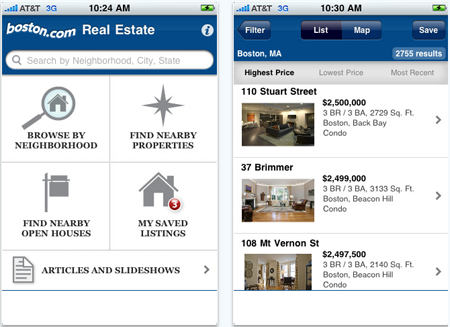
Yesterday, Boston.com, the website of the Boston Globe, announced the launch of its real estate-focused iPhone app. The new (and free) tool, per its iTunes description page, will allow users to:
• Browse complete listings from across Massachusetts, all of New England and Florida, including photos and floor plans.
• Search for properties by city or town, or use the built-in GPS feature to find homes for sale, rentals, and open houses near you.
• View those listings on a map or in a list format. Save listings you like, and create email alerts for your favorite searches.
• Upload and store your own photos and notes about any property you visit.
• Refine listings by property type, square footage, price, newly listed and more.
• Browse listings from Boston and Cambridge neighborhoods.
• Email your favorite listings to a friend.
• Contact agents quickly and easily by email or phone.
The Globe’s move into mobile real estate facilitation is of a piece with newspaper apps that Gawker might call “servicey“: tools, like The New York Times’ “Learning English” app (or, indeed, like the Times’ own real estate app), that are less about content-providing and more about…helping.
“We felt this was an extension of the real estate vertical value proposition we have for both our audience and our advertisers,” says Robert Kempf, VP/Digital for the Globe and Boston.com. The app provides a service both to users engaged in the exciting-but-often-mystifying-and-therefore-stressful process of home-buying (think Zillow, the interactive real estate platform) and to those who merely wish they were engaged in it (think Zillow, the interactive real estate porn site). Kempf highlights four main functions of the app, all of them geared toward convenience and usability: browsing listings by neighborhood, browsing listings by geolocation (“what’s near me right now?”), browsing open houses, and using an interoperable interface with Boston.com.
That last one is significant — for both users and, of course, the advertisers who love them. At the moment, Kempf told me, the Globe has about 95 percent of the area market’s real estate listings (some of which are then up-sold as premium listings). With the app, “we’re simply extending all listings, whether paid or not, onto the mobile platform. So it’s additional value for anyone who’s got a property listed on Boston.com.”
And though the paper plans to solicit sponsors for the new application, it doesn’t have one yet. Which means: “At this point, it’s additional value for our real estate advertisers,” Kempf says. Moreover, “there’s no intention at this point to charge a premium to our real estate advertisers for inclusion on this product. That’s just part of the value proposition for them when they engage with Boston.com.”
The other part of that proposition? Eyeballs. “It’s a matter of, we deliver a digital audience,” Kempf says. “We try to be agnostic about whether we deliver that audience on the web or mobile. It’s an inclusive strategy for our advertisers.” And the audience delivered by people interested in real estate — aspirationally or, you know, actually — is, of course, a potentially lucrative one for those advertisers.
The new app also provides a relatively closed area in which the Globe can experiment with and learn about the mobile space. In general, Kempf points out, apps offer two core opportunities for news organizations: use-case-specific platforms and location-based services. In the case of a real estate app, he says, “you have a very specific use-case — real estate — and you have a great opportunity to offer location-based services.” So while “we know that adoption, generally, of location-based services has been relatively low so far,” Kempf notes (true story), “we believe that real estate is on the leading edge of that as a mass-reached utility.”
The goal? While it’s still early on — and “really early to tell what the rate of adoption is going to be here,” Kempf notes — “I would like to see us be a dominant, if not the dominant, local real estate application that’s being used in the Boston market.” The same kind of penetration that Boston.com’s real estate section has had, Kempf says, he’d like to see the new app have in the mobile space. “We think it’s a great place to start.”